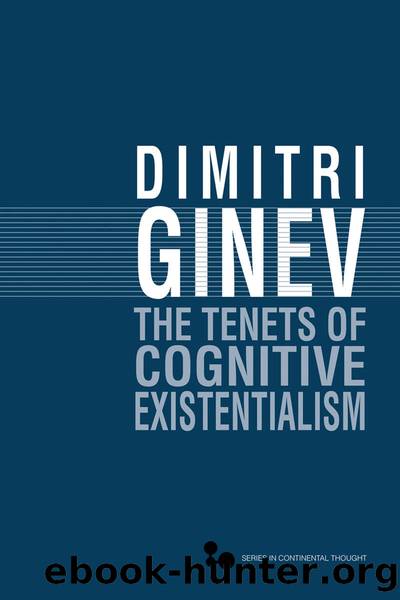Tenets of Cognitive Existentialism by Ginev Dimitri;

Author:Ginev, Dimitri;
Language: eng
Format: epub
Publisher: Ohio University Press
Published: 2011-11-15T00:00:00+00:00
CHAPTER FOUR
COGNITIVE EXISTENTIALISM AND POSTMODERN PHILOSOPHY OF SCIENCE
1. INTRODUCTION
In recent years two tendencies of radicalizing the search for a philosophy of science that avoids a reification of knowledge are observed. They can be described as a âpluralistic radicalization of epistemologyâ (provoked, to a great extent, by Feyerabendâs intrinsic criticism of postpositivism) and an âantiepistemological deflationist approach to scientific knowledgeâ claiming that there is no cognitive content independent of scientific practices. (Only the latter exhibits a tendency toward a postmodern turn in the philosophy of science.) Both tendencies share with cognitive existentialism the struggle against views like objectivism, postulated normativism, essentialism with regard to method, centricity of logical and semantic truth, representationalism, and the bias toward spelling out scienceâs philosophical identity in terms of epistemological justification. Nevertheless, the programs taking shape in both tendencies are incompatible with the agenda of cognitive existentialism.
To begin with, the aim of the pluralistic radicalization of epistemology is to develop an account of scientific knowledge that is responsive to the social-normative conditions in which this knowledge is produced. According to Helen Longino, a prominent champion of this program, the task is to overcome that dichotomous understanding of cognitive rationality and sociality that is a legacy of (the clash between) postpositivist philosophy and sociology of scientific knowledge. Overcoming this dichotomy will open the way for reintegrating a normative component into the social and cultural studies of scientific knowledge production. The interplay between studying the contingency of scientific decisions and their contextual normative justifications makes meaningless any version of the traditional context-distinction between discovery description and rational reconstruction. Yet the pluralist radicalization of epistemology beyond this distinction is not striving for a new context of science studies. It is, rather, guided by the conviction that by disambiguating some established senses of scientific knowledge, one would be able to offer nondichotomizing accounts mediating between a descriptive analysis of contingent relations and normative reconstructions of a postpositivist type.
Thus, there is a kind of âcontingent normativismâ involved in this program. There is also an important alliance with social epistemology since the cognitive norms are regarded at the same time as norms applying to practices of communities. The radical epistemological pluralism breaks with the picture of scientific knowledge as unified body. According to the very idea of local epistemology, âscientific knowledge cannot be fully understood apart from its deployment in particular material, intellectual, and social contextsâ (Longino 2002, 9). The program is a kind of naturalism, as far as it champions a radical exclusion of a transcendental dimension in treating the aforementioned interplay. The outcome of the latter is the emergence of âlocally normative epistemologies.â To be sure, there is a growing diversification of such epistemologies in all established scientific domains. Thus, the homogeneous philosophical portrait of a scientific domain, as it was nicely depicted by postpositivist Dudley Shapere (1984), has become completely irrelevant to the status quo. In each particular domain, the practical conduct of inquiry no longer requires a consensus on a single method or theory.
Longino states correctly, I think,
Download
This site does not store any files on its server. We only index and link to content provided by other sites. Please contact the content providers to delete copyright contents if any and email us, we'll remove relevant links or contents immediately.
| Anthropology | Archaeology |
| Philosophy | Politics & Government |
| Social Sciences | Sociology |
| Women's Studies |
Born to Run: by Christopher McDougall(6870)
The Leavers by Lisa Ko(6783)
iGen by Jean M. Twenge(5128)
Sapiens by Yuval Noah Harari(5094)
The Kite Runner by Khaled Hosseini(4923)
Spare by Prince Harry The Duke of Sussex(4750)
Bullshit Jobs by David Graeber(3790)
Livewired by David Eagleman(3514)
Never by Ken Follett(3489)
Machine Learning at Scale with H2O by Gregory Keys | David Whiting(3443)
Goodbye Paradise(3414)
Fairy Tale by Stephen King(2856)
A Dictionary of Sociology by Unknown(2828)
Harry Potter 4 - Harry Potter and The Goblet of Fire by J.K.Rowling(2777)
The Club by A.L. Brooks(2726)
The Social Psychology of Inequality by Unknown(2726)
People of the Earth: An Introduction to World Prehistory by Dr. Brian Fagan & Nadia Durrani(2600)
0041152001443424520 .pdf by Unknown(2569)
Will by Will Smith(2547)
